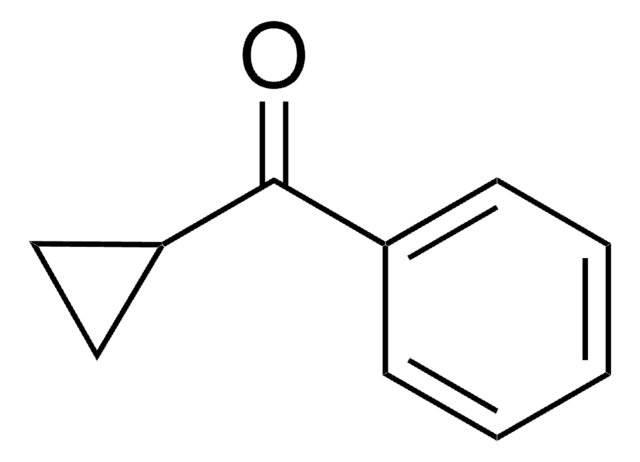158011
Cyclopropylbenzene
97%
Synonym(s):
Phenylcyclopropane
Sign Into View Organizational & Contract Pricing
All Photos(2)
About This Item
Linear Formula:
C6H5C3H5
CAS Number:
Molecular Weight:
118.18
EC Number:
MDL number:
UNSPSC Code:
12352100
PubChem Substance ID:
NACRES:
NA.22
Recommended Products
Assay
97%
form
liquid
refractive index
n20/D 1.533 (lit.)
bp
173.6 °C/753 mmHg (lit.)
density
0.94 g/mL at 25 °C (lit.)
SMILES string
C1CC1c2ccccc2
InChI
1S/C9H10/c1-2-4-8(5-3-1)9-6-7-9/h1-5,9H,6-7H2
InChI key
VFSFCYAQBIPUSL-UHFFFAOYSA-N
Related Categories
General description
Cyclopropylbenzene is a cyclopropylarene and its oxidation by rabbit liver microsomal cytochrome P-450 has been studied. Gas-phase structure of cyclopropylbenzene has been studied by ab initio computational, microwave spectroscopic and electron diffraction techniques.
Signal Word
Warning
Hazard Statements
Hazard Classifications
Flam. Liq. 3
Storage Class Code
3 - Flammable liquids
WGK
WGK 3
Flash Point(F)
111.2 °F - closed cup
Flash Point(C)
44 °C - closed cup
Personal Protective Equipment
dust mask type N95 (US), Eyeshields, Gloves
Certificates of Analysis (COA)
Search for Certificates of Analysis (COA) by entering the products Lot/Batch Number. Lot and Batch Numbers can be found on a product’s label following the words ‘Lot’ or ‘Batch’.
Already Own This Product?
Find documentation for the products that you have recently purchased in the Document Library.
The oxidation of cyclopropyl benzene by rat liver microsomal cytochrome P-450: an unusual triple oxidation of a substrate.
K E Suckling et al.
FEBS letters, 145(2), 179-181 (1982-08-23)
C J Suckling et al.
The Biochemical journal, 232(1), 199-203 (1985-11-15)
The arylcyclopropanes (cyclopropylarenes) cyclopropylbenzene and diphenylcyclopropane are oxidized by rabbit liver microsomal cytochrome P-450, both by the microsomal fraction and by the purified cytochrome in a reconstituted system. The products formed, principally benzoic acid, are due to an unusual triple
P Riley et al.
Xenobiotica; the fate of foreign compounds in biological systems, 24(1), 1-16 (1994-01-01)
1. The metabolism of cyclopropylbenzene (1a) and 4-cyclopropylanisole (1b) was studied using liver microsomal preparations from control, phenobarbital- and beta-naphthoflavone treated rats. 2. With all three types of microsomes 1a was metabolized by benzylic hydroxylation to give 1-phenylcyclopropanol and by
Q Shen et al.
The Journal of organic chemistry, 66(17), 5840-5845 (2001-08-21)
Ab initio computational, microwave spectroscopic, and electron diffraction techniques have been used to study the gas-phase structure of cyclopropylbenzene. Theoretical calculations at the HF, B3LYP, and MP2 levels for basis sets 6-31G(d) and 6-311G(d) have been carried out. Both MP2
P Taavitsainen et al.
Drug metabolism and disposition: the biological fate of chemicals, 29(3), 217-222 (2001-02-22)
Currently, there are no selective, well characterized inhibitors for CYP2A6. Therefore, the effects of trans-(+/-)-2-phenylcyclopropylamine (tranylcypromine), a potent CYP2A6 inhibitor, on human liver microsomal cytochromes P450 (CYP) were studied to elucidate its selectivity. The IC50 value of tranylcypromine in coumarin
Our team of scientists has experience in all areas of research including Life Science, Material Science, Chemical Synthesis, Chromatography, Analytical and many others.
Contact Technical Service









